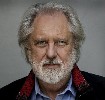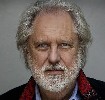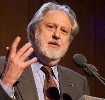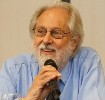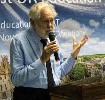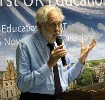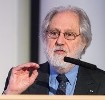The BBC's Future: Charter renewal and beyond- Where Now For The BBC's Duty To Educate?
In his speech at the Science Museum in September 2015, BBC director-general Tony Hall acknowledged that the charter review presents the corporation with not only significant challenges, but also with opportunities to reflect and adapt to the digital world. In my view, nowhere are these opportunities greater than in education.
Over 70 years ago, Lord Reith famously made education one of the three pillars of the BBC: to inform, to entertain and to educate.
The BBC took Reith’s mantra very seriously, and over the decades it has, for the most part, been an innovator in education. In 1942, the Corporation transmitted its very first radio broadcast to schoolchildren around the UK, and in the 50 years that followed the BBC successfully led the way in ‘bringing education to the people’ via BBC Broadcasting for Schools and Colleges on radio and television. In 1965 the BBC collaborated with the Open University, introducing ‘distance learning’ and transforming the very nature of higher education by allowing students access to inexpensive higher education at home. In 1980, David Allen and Robert Albury were sent from the BBC to ‘go and see if there is anything in this microelectronics business’ (Blyth 2012). The advent of the digital age provided the BBC with the opportunity to deliver education in radically new ways. Nonetheless, education can sometimes feel like the unloved child of the Reithian trinity.
Take the example of BBC Jam. In early 2007 the BBC Trust took the grievous decision to scrap the online education service.
Four years earlier the government had boldly announced the development of the world’s first truly ‘digital’ curriculum – with the BBC committed to investing £150 million to deliver newly created material into just half of the subject areas.
It was designed to be a ‘partnership’ with industry, to the benefit of the learning opportunities of every child in the land – and eventually possibly even every child in every land. But despite its pioneering approach to developing a digital curriculum and hundreds of thousands visiting and registering on the platform, BBC Jam lasted little more than a year.
In times past the BBC found it difficult to be ‘partner’ with anyone and, as a result, probably overplayed its hand. Equally the commercial sector could justifiably be accused of deliberately delaying and frustrating the entire initiative.
Was every child in the country disadvantaged by the short-term and myopic manner in which, between them, the BBC and the commercial sector managed to wreck the entire scheme?
The answer to that is – unquestionably!
Eight years later our education landscape has broadened massively, and the BBC is no longer its sole audiovisual operator. Hundreds of companies including FutureLearn, the Pearson Group, TES, Goldsmiths, EF and the Consortium Education offer educational content for schoolchildren, university students, graduates and teachers. And there is a blossoming ecosystem of startups developing resources, often designed by entrepreneurial teachers themselves, such as Diagnostic Questions, Class Charts and Show My Homework.
Not only are there infinitely more providers than ever before, but also a far greater range of media through which to channel education. Independent learning is no longer limited to television and radio – today we are living in a hyper-connected world where people can study on their computers, laptops, iPads, tablets and mobiles, whenever and wherever they choose. The internet has paved the way for companies to collaborate with universities around the world to create massive open online courses, or MOOCs. This has encouraged the number of UK-based distance learners to jump by 50 per cent over the last decade to over 260,000. The UK has also become a powerful hub for learning: FutureLearn has 2.5 million registered users, and TES.com, with over 7 million registered teachers from all over the world, is the first port of call for those seeking inspiration from its inventory of a million mainly teacher-generated resources, which are being downloaded almost 1.5 million times every day.
These transformations in education have certainly not rendered the BBC obsolete: 97 per cent of the population continues to use the BBC every week, with 46 million users relying upon it every day. According to the Future of the BBC report published earlier this year, 77 per cent of interviewees considered that ‘providing education’ should be a priority for the BBC (CMSC 2015).
The future of education is obviously online.
However, it is critical that we view the digital progression as something wholly transformative, not simply as a useful ‘add on’, but something that can change the nature of both media content and the way in which learners go about their daily lives. By increasing its investment in creativity and narrative learning, the BBC has a massive opportunity to advance the standards of online education on a global scale.
The future of education will inevitably involve a more flexible approach to learning as more and more people are able to access educational content on their mobile devices wherever and whenever they choose. In the Future of the BBC report, 56 per cent of participants viewed ‘enabling people to adapt to new technologies’ as a priority for the BBC (ibid). The BBC must play a key role in both creating and adopting these new technologies.
In his Science Museum speech, Tony Hall spoke about the BBCs future in the digital world and the importance of an ‘open’ BBC which will be instrumental in creating platforms to support other public institutions, ‘helping them make the most of the digital age’ (Hall 2015). I want to see this more ‘open BBC’ take responsibility in engaging with a wide range of other education providers to help them also make the most of the digital world.
But this absolutely requires investment – and the BBC’s investment in education has been heavily slashed in recent years.
I’ve been in politics quite a long time and I know there are two ways of looking at policy development. One is to say ‘this is our vision of how education should look in 2020–2025, because if the UK is going to be a seriously competitive nation we will need the skills to make that possible’.
The other way is to say ‘we’ve been talking to government about charter review and they’re very concerned that we save some money; so we’ll lower our expectations, and our vision, to the point they believe to be affordable. That way we won’t be embarrassed if we fail to deliver on our vision.’ Surely there’s only one way to look at what’s possible on behalf of the next generation, and then pull every lever we can to get them there.
The BBC is an instantly recognisable and trusted brand, and for more than 70 years it has delivered world-class services globally. The advent of online education provides any number of opportunities for the BBC to continue to adapt, improve and innovate in order to continue to deliver world-class education services. For all of us as citizens it must seize them.
Written by David Puttnam


